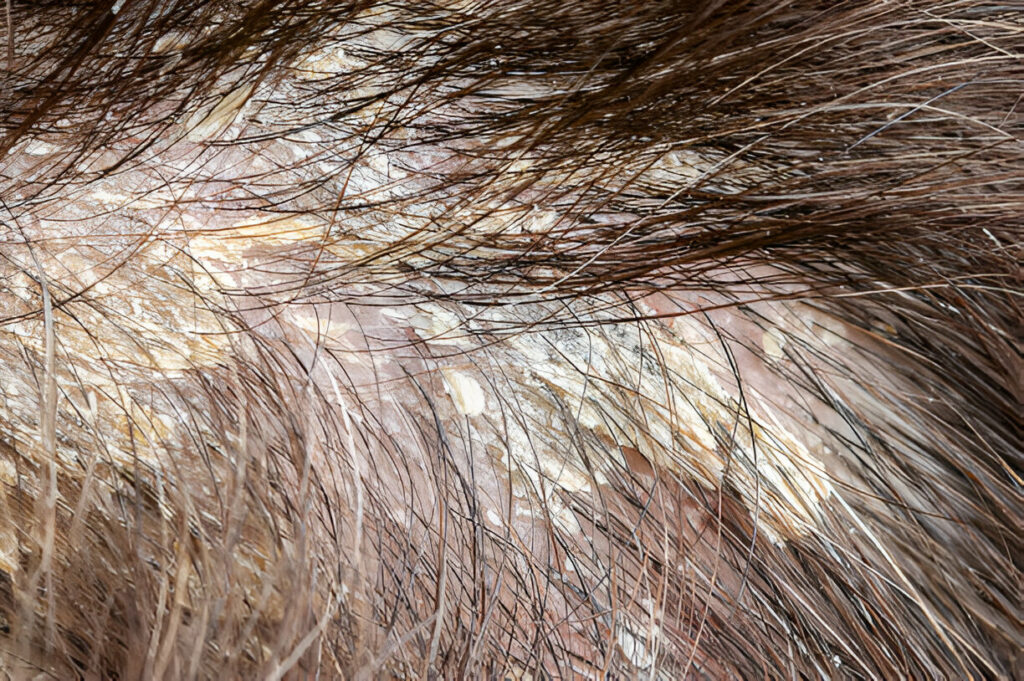108, Shangrila Arcade,
Nr. Shyamal Cross Road,
Satellite, Ahmedabad - 380015
Understanding Dandruff and Seborrheic Dermatitis
These common scalp conditions can cause discomfort and embarrassment, but with the right knowledge and treatment, you can keep them under control.
What is Dandruff?
Dandruff is a mild form of seborrheic dermatitis and is characterized by flaky, itchy skin on the scalp. These flakes are dead skin cells that naturally shed off, but in larger, more noticeable amounts.
What is Seborrheic Dermatitis?
Seborrheic dermatitis is a chronic inflammatory skin condition that affects areas rich in oil glands, including the scalp, face, and upper body. It can cause redness, greasy skin, and yellowish scales, in addition to the flaky, itchy skin seen in dandruff.
Causes of Dandruff and Seborrheic Dermatitis
The exact cause of seborrheic dermatitis is unknown, but several factors can contribute to its development:
- Yeast (Malassezia): This yeast is naturally found on the skin but can overgrow, leading to dandruff.
- Oil Production: Excess oil on the skin can provide a breeding ground for yeast.
- Genetics: A family history of seborrheic dermatitis can increase your risk.
- Weather: Cold, dry weather can exacerbate symptoms.
- Stress: High stress levels can trigger or worsen the condition.
Symptoms to Watch For
- Flaky skin (white or yellow)
- Red, greasy skin covered with flaky white or yellow scales
- Itchy scalp
- Areas of greasy skin on the face, sides of the nose, eyebrows, ears, eyelids, and chest
Treatment Options
At New Touch Skin Clinic, we offer various treatments to manage dandruff and seborrheic dermatitis:
- Medicated Shampoos: Ingredients like ketoconazole, selenium sulfide, and zinc pyrithione can help control yeast growth.
- Topical Treatments: Steroid creams and antifungal treatments can reduce inflammation and yeast overgrowth.
- Lifestyle Changes: Regular cleansing, reducing stress, and using non-irritating skin products can help manage symptoms.
- Professional Care: For persistent or severe cases, our dermatologists can provide personalized treatment plans.
To know more, follow this link: https://www.aad.org/public/diseases/a-z/seborrheic-dermatitis-overview
When to See a Dermatologist
If over-the-counter treatments aren’t effective, or if the condition worsens, it’s time to see a dermatologist. Persistent itching, significant discomfort, or large areas of scaling and redness should be evaluated by a professional.
Final Thoughts
Dandruff and seborrheic dermatitis can be managed with the right approach. At New Touch Skin Clinic, our experienced dermatologists are here to help you achieve a healthy, comfortable scalp. Don’t let these conditions affect your confidence — schedule an appointment with us today!
- Best Full Body Whitening Treatment
- Full Body Lightening Treatment
- Best Laser Hair Removal Clinic
- Permanent laser hair removal
- Hair Removal in Ahmedabad
- Melasma Treatment
- Naturopathy Treatment for Alopecia Areata
- Full Body Brightening
- Skin Lightening & Whitening
- Carbon Laser Peel
- Hydrafacial Treatment
- Anti-Aging Treatment
- Hair Transplant
- Body Contouring
- Tattoo Removal
- Hair Loss Treatment
- Facial Treatment
- Acne & Scar Reduction
- Laser Hair Removal

For Best Treatment
Get ConsultationConsultation Fee: ₹1000/-
(Consultation fee will be waived if you avail any service or purchase any product.)


